This outing is going to be a bit more No Frills than is typical, simply because I’m tighter on time and energy this evening. Fortunately, we keep the bar set low, so clearing it shouldn’t ought to be a challenge. But expect a lot less cleverness in the jokes this time out.
A couple of quick recommendations from other places before we start. As pointed out by Mark Evanier at his always-educational blog here, The Remotes are a cover band who perform nothing but old television theme tunes. so they trade in a strange mix of nostalgia and novelty. Prowling around their site, I came across this truly excellent mash-up, Knight Rider of Bel Air.
And then, courtesy of Kieron Gillen, whose own Newsletter can be subscribed to here, Tom Ewing has completed his thorough analysis of Dave Sim’s CEREBUS over at Freaky Trigger. That’s a series that meant a great deal to me in the 1980s and early 1990s before its inevitable slide into misogyny and madness—and even them, I still often found it fascinating due to the sheer quality of its cartooning and mastery of the comic book form. Ewing dives deep both into the material and the forces which shaped it—I spend a couple hours this evening reading over the whole of his essays, some 60,000 words in total. Good stuff for those who have an interest.
That Subscription button means that it’s time to get into the question and answer portion of the proceedings! So here we go!
Joe West
You mentioned last week that we’ll be seeing more solo books than ever before in this new X-Men era? How will it be decided who gets these solos? Will it be based on who had successful solos in the past or will more risks be taken for characters who haven’t gotten that spotlight yet?
This is going to sound a little bit arrogant or self-aggrandizing I’m sure, Joe—but I’m going to decide. And it’ll be based on a number of factors, including which characters seem to have the best chance of selling a solo project, what creators want to tell stories about what characters, and what ideas for approaches for solo concepts come up, whether from me and the other X-Editors or else the talent pool as a whole.
Zach Rabiroff
I reemerge this week with a question for, this one posed via a conversation with noted Tom Brevoort newsletter subscriber Al Kennedy. Al, and I, and Ralph Macchio are all great fans of the 1990's Steve Gerber/J.J. Birch maxiseries Foolkiller -- which has, to this day, never been collected. I wondered if, Gerber being himself, there were contractual issues around profit-sharing, etc., that might be at root. Or, alternatively, if it's just because we three are the only Foolkiller aficionados in the comics market. Do you happen to have any insights on this one?
So far as I know, it’s the latter, Zach—there just hasn’t been a whole lot of interest in FOOLKILLER, not enough to justify a collection of it. But I agree with you guys and Ralph that it was a pretty fascinating project. And given enough time, everything gets reprinted eventually.
Pedro J. Caro
One constant with the history of the X-Men is the lack of Xavier. The teacher-mentor figure has repeatedly disappeared, presumed dead, been depowered, incarcerated, and any number of things the creative team could come up with in order to make the students have to deal with life by themselves. Now, I understand the need to challenge the character into growth and self-reliance, but on the other side I feel Xavier may be too powerful in order to keep stories interesting, and thus one of the first order of business for any new writer (or editor) of the franchise is to bench him for a while so that he can't "magically" (read: telepathically) solve any given situation ("The humans shall forget the happenings of this night, my X-Men. Now return to the mansion"). I also think that not many writers (apart from Claremont) have been able to do anything interesting with him apart from coming up with some nasty thing that he did and made his students lose their trust in him, but that's another matter entirely and related to my personal preferences.
Now, given what we have read of Fall of X so far, and seeing what has been announced of your stint so far, it seems that the new era is going to start Xavier lacking. So I'd like to read your thoughts on the character, and whether you think he's more of a device or something interesting can be told of him. And whether you plan to use him in the future.
This one is going to be tricky and easily misinterpreted, but please bear with me here: one other thing that was very much "an X-Men thing" (especially during the 80's and Claremont's run) was the sexiness thereof. I'm not talking anything directly breaking the comics code, but the characters would be shown around (never in an explicit way) and, well, let's say for a teenager with raging hormones it was interesting to see Marvel challenging the limitations of what would be seen/suggested in a superhero comic. To me, it was part of what made the X-Men different, and certainly a part of the "dealing with teenage and changes" themes that I feel belong with the core concept of the series (in addition to the "Feared and hated by a world they must protect" bit). Now, I know the U.S. is a different thing nowadays than it was back then, and that Marvel was a solo operation (or more or less left to its own devices when owned by Cadence, for instance) and now it's part of the largest entertainment conglomerate, but I'd like to know whether "pushing" some sexiness is downright anathema these days, or is more or less accepted. I ask this because Gail has never been shy on this department, for instance, and also because, as I said, pushing the envelope on this department is part of the appeal of the title to me. I'm not talking outright nudity à la Game of Thrones or Shameless, but rather the odd suggestive situation here and there, à la Morning Show or any other Apple TV + show, which is the level that I understand to be acceptable these days. Also, given that Marvel seems to have started to push the envelope with violence and gore (with the "Red Band" editions of Blood Hunt and Werewolf by Night), I'm certainly curious on whether there're plans for any similar effort with suggestive themes (and perhaps some "black band" editions going as far as Epic or Max went back in the day). Again, just curious. I know there's lots of indie editors where you can easily find that, but the levels of sophistication in, say, Elektra Assassin, were something very much enjoyable. I also seem to remember Neil Gaiman telling a story (in a Comics Scene interview) of wanting to sell a story about Stephen Strange journey from the U.S. to find the Ancient One and discarding it because Marvel would never want to do it. I don't know, I feel there's space to tell a slew of intelligent, a bit more mature, well produced and tasteful stories with the Marvel characters out of the Marvel Universe proper and I for one would like to see some made, but I don't know whether the market would support that. Just curious on your perspective on this.
That’s a whole lot of question there, Pedro, but it really seems like it boils down into two issues. so let’s try to take each bit in turn. As far as Professor Xavier goes, I think he has the same problem in the modern age that such characters have been facing going back to the 1970s at least: he’s an authority figure, and as a culture, we have a deep distrust of authority figures. Consequently, on multiple occasions, Xavier has been shown to be not just flawed but actually abhorrent in his actions, betraying the morality that he’s meant to represent. Speaking for myself, I feel as though Joss Whedon and John Cassaday’s Danger story tainted the character in a permanent way, and then the reveal of the Deadly Genesis X-Men team that he’d sent to their deaths and wiped everybody’s memory of completed that process. There’s flawed, and then there’s being a monster, and especially in a world in which Magneto is more and more often presented as being on the right side of their philosophical argument, that means it’s difficult for Professor X to fulfill the role that he was designed for. And that’s a genuine problem given that the entire series is predicated on “Xavier’s dream”. For all that people can say, “Love the dream, hate the dreamer”, I don’t think it’s anywhere near that simple in practice. So that makes it tough to do anything with Xavier that isn’t more of the same, more instances wherein he’s shown to be a compromised individual whose moral compass is highly situational. Beyond that, I don’t really want to say anything more, as Xavier is in active play throughout the conclusion of the Krakoa books and I wouldn’t want to spoil anything about that storyline ahead of time. in terms of the sexiness, I think there’s a difference between sexiness and exploitation, and so we’ll certainly attempt to give you some of the first while trying not to stray over the line into the second. But we are dealing with a general audience, and so while we want to be sophisticated and intelligent in our storytelling, we do also need to be aware of the fact that, for example, the release of X-MEN ‘97 is likely to result in a whole new bunch of younger readers being interested in these characters. So we need to walk a line.
Arthur
1. If you could assemble the next roster of Avengers, who would be on the team?
2. What are some of the most common things/mistakes you have to fix when editing a comic?
3. If you’ve read them, any thoughts on Grant Morrison’s Animal Man and Doom Patrol?
I’ve done this a whole lot across the past 26 years, Arthur. Time for somebody else, such as Wil Moss, to take a stab at it.
Characters not being named. And by named, I mainly mean the super hero code-names, though sometimes it can be difficult to find any name at all. It’s basic craft: name all of your characters in every issue!
I read them both in real time as they were coming out back in the late 1980s, and I was a huge fan of both. This is why it was such a big deal to me to have gotten to work with Grant and Mark Millar on SKRULL KILL KREW back in the early 1990s.
Leigh Hunt
Curious to know how far ahead you are in your X-planning? Of course things can change especially after the books start coming out and critical reaction will affect things but as of right now, where are your concrete and not-so concrete plans up to for the X-books?
As you’d expect, it varies from title to title, Leigh. But for the three books with X-MEN in the title, I’d say that we’re pretty solid through the end of the year and our first tiny little crossover moment. And from there, as we get into 2025, we’re talking about a storyline for around March, a special project for May, potentially a key one-shot for June and a big X-line Event around October. But all of that is subject to change as conditions on the ground shift in real time.
Jeff Ryan
I was reading Walt Hickey's You Are What You Watch, and he has an interview with you about Marvel and superheroes. One of his conclusions was that most superpowers lend themselves to teamwork and heroism, but "antisocial" powers like "intimidation or compulsion" forced whoever possessed them into a villainous role. Does that gibe with your take -- Purple Man, Dark Phoenix, Puppet Master, etc?
I don’t know that things quite jibe so neatly as a whole, Jeff. But there aren’t too many good guys with mind control powers—and those that have them, like our friend Professor Xavier, have a tendency to reveal more villainous leanings. But that’s really a function of interesting storytelling. If your super hero has the power to control people’s minds and make them do what they want, that pretty much means that most stories are over as soon as they show up and tell the bad guys to give up. Not exactly the most compelling premise for a super hero series, really.
Sergio Flores
If I recall correctly, you are a big Barry Allen fan, at least of his Silver Age exploits. Since you are also a big fan of the Wolfman/Perez run on New Teen Titans, what are your thoughts on Wally and his eventual taking on of the Flash mantle? For myself, having entered the world of comic books via the NTT series (and others), I was able to see Wally go from Kid Flash to retired and then to becoming the Flash, as it was happening, and he became “my Flash” over the next few decades. My only real exposure to Barry at the time was through the trial issues and Crisis, so I didn’t have a strong connection to him. Curious to hear your thoughts on Wally’s development.
Oh, I liked it for the most part, Sergio, even if Mike Baron’s Wally West didn’t seem a thing like Marv Wolfman’s Wally West in terms of his outlook and personality. But I liked the idea that Wally would take over as the legitimate Flash (and especially liked it more than the idea that there’d be some new hero with unrelated powers who’d be called the Flash, which was what was planned initially.) But it was really Mark Waid, and then Geoff Johns, who made Wally a thoroughly likable character.
Mortimer Q. Forbush
Were there any editorial or writerly reasons to move (and pretty much keep) the Avengers out of the mansion?
Just really not having any desire to go backwards, Mortimer. In practical terms, there isn’t a whole lot of difference between a Mansion in the city and a Tower in the city in the first place, apart from nostalgia for the latter.
Iioo
While on the topic of time travel, here's a question. Thanks to Al Ewing's Venom I now know Mark Gruenwald has made an attempt to formulate the rules to time travel in the Marvel Universe. They are somewhat unusual, in particular they say any time a character travels in time and returns, there exists a timeline where they never return. Was there even ever a comic addressing this? Was there ever much effort to follow those rules?
That was a set of rules that Mark created and tried to enforce throughout the latter 1980s and the first half of the 1990s, Iioo. But for all his efforts, they don’t really work to the betterment of storytelling. To give an example, in Mark’s version of how time travel worked, AGE OF APOCALYPSE would never have happened, because if Legion had gone back in time and killed Professor X back in the day, that would have resulted in a skewed alternate timeline and not the transformation of the actual Marvel Universe. It also tends to boil down any choice any character makes to meaningless, as somewhere else in an ever-branching cosmos, every other possible choice that character could have made is also playing out. The energy involved in such an infinitely-expanding series of alternate timelines is staggering to consider. So it sounded good in terms of trying to make the time travel make sense, which is something that concerned Mark a lot, the plausibility of the universe. But the reality is that none of this stuff really makes sense, it’s all fantasy—so what serves the storytelling, the dram, the adventure better is the thing to do.
Cian McDarby
A good friend of mine pointed this out to me recently and it’s been bugging me ever since: Why don’t house ads have the actual release date? Wouldn’t the second most important part of the ad be to tell people when the comic is coming out? It feels like the month alone is kinda over vague.
I also have a second question on why so few Marvel books consistently hit the same week multiple months in a row? It’s mildly annoying as a reader to have no instinctive idea what week a book is coming out on.
The difficulty with listing the release date in the house ads, Cian, is the fact that ours move so regularly as we adjust to give our creators sufficient time to do the best work they can. The only certainty if you list a date is that half the time, it isn’t going to be accurate—so what would be the point? And that’s because of the reason for your second point. Because it takes the average penciler around 6 weeks to draw an issue these days but we release our books monthly, we tend to stagger later issues later into the month in order to preserve a consistent creative run. We could keep, say, AMAZING SPIDER-MAN in the first week every single month, but that would mean that the artist in question would only have 4 weeks between issues, which would mean even more frequent fill-in art.
Steve McSheffrey
Two ignored plot threads that I've wondered why non one's touched:
In his Ms Marvel series, Brian Reed left an insane Carol Danvers from another Earth imprisoned. Wouldn't that have given the X-Office a clear way to return Rogue to the classic power set of having Ms Marvel's powers?
Also, there was that extended subplot where Northstar was in love with Iceman but it was doomed because Iceman was straight. Shouldn't there have been some scene somewhere of Northstar feeling betrayed now that Iceman isn't so straight anymore?
The answer to both of these questions revolves around the same underlying point, Steve. And that’s that no subsequent writer has been interested in following up on these situations. In the first instance, this is something that I hate in our books as a general rule—littering up the landscape with doppelganger versions of our heroes. There isn’t a whole lot of value, in my opinion, in having a second evil Carol Danvers from Earth-Whatever running around. And I especially wouldn’t want to use such a set-up to do something central such as restoring Rogue’s powers. (At that point, why not just recruit the still-empowered Rogue from Earth-Whatever, right?) And in the latter case, we don’t ever get to see every moment of the characters’ lives. So chances are there was a moment such as that one for Northstar. I also suspect that there may have been a moment when he confronted Bobby about it, and Iceman told him, “No, it wasn’t because of my sexuality, I don’t like you because you’re an arrogant asshole.” Or words to that effect.
Carlos
Execptional X-men is about Kitty in centric role besides Emmma and the new mutatans or is about Emma in centric role besides Kitty and the new Mutants?
It’s a team book, Carlos, so I suspect the answer depends on which character you ask.
Sean Stoltey
I was wondering if the original pitch from Bendis ended with Siege? As I'm approaching that story, my memory is that New Avengers seemed to struggle to find its reason for being after this and AvX.
No, Sean, that isn’t the way it went at all. And all of the later post-NEW AVENGERS launch developments were worked out as things moved ahead and Brian came up with further ideas.
Matt Strawbridge
It's almost May and something has been bugging me. Other than the facsimile issue editions, variant covers and the Secret Wars Battleworld mini by DeFalco/Ollife, will there be any further celebration for Secret Wars 40th? It seems a little light, to me, for such a famous and important storyline, no matter what opinions are of Shooter (I know I got mine...).
That seems like plenty of celebrating a 40 year old series to me, Matt, though your mileage may differ. I’d rather focus on new stories than revisiting the glories of old ad nauseum. And in terms of the SECRET WARS toy line, that’s really be a question for Hasbro as they decide what lines they want to manufacture and market. If they thought there was enough demand for it, perhaps they’d do a new version of that toy line.
Corey
A friend of mine asked me a while back where I find out how long a writer is planning on writing a current run, and I didn't have a good answer for him. Obviously it depends on sales and a number of other factors, but for example if he's enjoying the Ryan North Fantastic Four, is there ever a way to know how long Ryan is planning to write it or if he does have an exit in mind is that kept secret? Similarly, I assumed GODS was going to be longer until you mentioned in a newsletter that it was ending with issue 8. I get most of my comic news from you, so I very will may have missed it initially, but was that always public knowledge?
In most cases, Corey, assuming you’re talking about a run on a perennial title, it’s an open-ended assignment. So it really comes down to whether the series continues to perform well and whether the writer and the editor continue to enjoy working together on it. So in the case of Ryan on FANTASTIC FOUR, there isn’t any specific end date. it’ll come eventually, but exactly when I couldn’t tell you. And that’s the case in most similar instances. Every once in a while, you get a writer such as Jeph Loeb or Mark Millar who come onto a title to do a specific storyline or series of storylines, and in those cases you have an end date. But more often, it’s the first instance.
Julian Eme
Please can you comment on the circumstances that led to Nick Spencer's run on Captain America? How much of Rick Remender's plans for the series survived in it, where did the idea of Cap Hydra come from, how did it evolve into what eventually became Secret Empire and were you affected in any way by the hateful messages from some "readers"?
No part of Nick’s run on CAPTAIN AMERICA came from Rick, Julian, apart from Sam Wilson then being Captain America. Having done the series for a couple of years, Rick chose to take his leave after SECRET WARS, and so Nick came on board to take over the book, bringing his storylines with him. So the idea of Hydra Cap and Pleasant Hill and Secret Empire all came from Nick and were bounced around with me and my junior editors and the involved artists. And certainly getting death threats and such wasn’t the most fun I’ve ever had, but I expect that Nick took the worst of it. Nothing in that storyline was altered due to that feedback, though. I’ve done a lot of these projects over the years, I’m used to being hated by a segment of the audience while we’re in the midst of a challenging storyline.
Behind the Curtain
.Here’s a pair of extremely flattering photographs of editor Nick Lowe and myself from years back, during the time of SECRET INVASION. We were working on some manner of promotion for the series, a video or some such, when we wound up donning these wigs.
I tend to think that Nick would have made a better Gwen than MJ, but that may be my almost constant desire to throw him off the top of a bridge talking.
Pimp My Wednesday
Hey, big week, big stuff! Let’s go!
Summer must be just around the corner, because it’s time for another big Marvel Event series, in this case BLOOD HUNT by Jed MacKay and perhaps the best artist currently working, Pepe Larraz. Pepe absolutely kills on this series, and nowhere is that more evident than in the more graphic polybagged Red Band editions of each issue, which will contain additional pages as well as more explicit versions of specific moments. This is a horror series as much as a super hero one, after all. It all grows out of events across Jed’s many titles, including AVENGERS, DOCTOR STRANGE and MOON KNIGHT, and if you were one of those who sampled the BLOODLINE series a while back, you’ll be glad that you did.
And, hey, next Saturday is Free Comic Book Day, so be sure to stop by your local comic book retailer and grab this year’s new free releases. Marvel’s got a couple of them, but the one of import to us here is this one, the FCBD BLOOD HUNT edition. Not only does it contain a completely new BLOOD HUNT story by Jed MacKay and Sara Pichelli, but it also features my team’s very first little X-MEN tale starring Jubilee, as presented by Gail Simone and David Marquez. I’m going to be braced for your feedback on that story come Saturday (I’m betting on a lot of, “Meh. bring back Krakoa.”) so don’t let me down. And also, don’t be a cheapskate, pick up some actual for sale comics from your retailer while you’re down there, he needs to eat too!
A Comic Book On Sale 20 Years Ago Today, April 28, 2004
DAREDEVIL: FATHER was a bit of a passion project for then-Marvel Editor in Chief Joe Quesada. It was working on DAREDEVIL as a part of the Marvel Knights deal with his company Event Comics that had put Joe into a position to be offered that EIC position in the first place. So the character was always one that was close to his heart. Additionally, having worked with any number of great writers up to this point, Joe was itching to write a story himself, one that would be more personal to his experiences. DAREDEVIL: FATHER was the result. It was noteworthy for a bunch of different things, one of which was that Joe changed up his approach to the character for this project, depicting the Man Without Fear as far more blocky and massive than he was typically drawn. I don’t know if Joe was being influenced by Frank Miller’s DARK KNIGHT RETURNS or Mike Mignola’s work or what. But it was an effective choice. The big thing that I remember it for, though, was how late it ran. Working a full time day job as EIC meant that Quesada only had so many hours left in the day to buckle down and produce pages. So it took a long while for the final issues to see the light of day, though they eventually came. For my part, I was merciless in needling Joe during this period—I would routinely refer to the series as DAREDEVIL: GRANDFATHER because so much time had passed. Joe took it all with good humor. As he rounded third and was close to wrapping up the final issue, I designed the T-Shirt that you see below. I never went ahead and got the things printed, but they did get at least this far—so I thought I’d share them with you and get some use out of them.
A Comic I Worked On That Came Out On This Date
Speaking of SIEGE as we were in the Q & A portion, this final issue of NEW AVENGERS, a SIEGE tie-in, came out on April 28, 2010. After this, we relaunched both AVENGERS and NEW AVENGERS as a part of the more optimistic HEROIC AGE promotion, with Brian Michael Bendis writing both books. Art on this issue was provided by Mike McKone, who I think was filling in to give regular artist Stuart Immonen some additional lead-time on the new launch. Anyway, this was the final issue in that initial run of NEW AVENGERS that had started in the aftermath of AVENGERS DISASSEMBLED and which had maintained the top spot as the best-selling series in the Marvel line for several years. SIEGE was designed to be something of a bookend to DISASSEMBLED as it represented the first time that Captain America, Iron Man and Thor were all united and fighting side-by-side since the destruction of the classic Avengers took place. So it was a good stopping point, as Sean indicated. Our real mistake, though, was in listening to all of the readers who were then complaining about “Event fatigue” and deciding that for the first year of THE HEROIC AGE, we wouldn’t do any big Event series. More than anything, I think it was that decision that took the wind out of our sales and allowed the competition to make up ground and re-establish themselves. We corrected thereafter, but the damage had been done.
The Deathlok Chronicles
Once again, DEATHLOK’s co-writer Gregory Wright:
Gregory Wright
Believe it or not, Dwayne and Denys never once let on that they were working on Milestone. I was as surprised as everyone when the announcement came. I was also hurt...I couldn't believe Dwayne, one of my best pals had not at least let me know what was going on. I took it kinda personal at the time. But, he knew I was pretty loyal to Marvel, and that telling me might have risked the news getting out before he wanted it to...which could have led to him losing other work he needed at the time. Plus, the ORIGINAL intent was that Milestone would be utilizing primarily black creators...which of course I wasn't. At any rate, it wasn't personal and it explained a LOT about what was happening with Denys's work at the time, especially his becoming late....which was unusual for him. I was a HUGE fan of everything they did at Milestone and always wished I could have been a part of it.
It was strange to have this issue in my hands to color after having 5 issues that I wrote and colored. I really enjoyed coloring it. I was hoping to get to write stories with Denys using this style when I KNEW he was going to draw like that...sigh. Except for the rivets that now showed up lol. And yes...both Mike and I were incredulous that you allowed Deathlok to fly on an airplane...but Dwayne would come up with stuff like that...and then find a way to convince everyone that it was plausible. He was tough to argue with. I liked the gun bit though. One thing that differed between how I approached story and how Dwayne did occurs right after the plane. Deathlok has to break into a STARK facility...one panel he talks about it...the next...he's in. I would have needed to see HOW he did that and would have had a page of him cleverly breaking in. The issue does have one of my favorite lines, "If I ever do get my life back, maybe I'll send you a resume." Typical Dwayne...the lines says so much about how Micheal feels, and what he wishes his life was, and how he could see that from his interaction this issue.
I can understand you feeling that way about Dwayne not looping you in on the development of Milestone Media, Greg. But I think he was probably right not to do so. As you say, it would have made things way tougher for him had news of the impending line gotten out prematurely, and so the fewer people who were in the loop on that stuff, the better. You were closer to Dwayne than I was, but I never took it at all personally that he and Denys had said nothing. And like you, I was very fond of the Milestone titles, in particular their first year or so. Nice to see a bunch of that material back in print in those huge Compendiums DC has been issuing.
DEATHLOK #12 saw print exactly 32 years ago today, on April 28, 1992. It was the first part of Dwayne’s next four-issue arc, “The Biohazard Agenda.” I can recall Dwayne in particular being very excited about using the “scary” biohazard symbol as a part of the cover bannering on this story. But the big thing to happen in this issue was a major change of status quo for the character.
I never spoke to him about this directly in the years thereafter, but knowing that Dwayne was profoundly keyed in to the image of Deathlok as a black super hero, I suspect that he wasn’t comfortable with the idea that Michael Collins was separated from his wife and child thanks to his cyborg condition. I suspect it felt to him too much like the stereotype of the “deadbeat dad”. So when it came time to do this storyline, Dwayne campaigned hard for me to allow him to reveal Deathlok to his family. Now, this was only issue #12—a status quo of this nature would typically go on for years before it might start to get changed up. And I wasn’t all that wild about rushing into this new situation. But Dwayne was persuasive and came on very strong in this instance, and I rationalized to myself that this would be a shocking, surprising moment for an audience used to the idea that these running situations went on indefinitely. In retrospect, it was almost certainly a bad idea to do this at this point, and it was likely one of the factors that helped contribute to the series’ demise. Because it robbed the book of conflict. Sure, Michael was still trapped within his cyborg form, but he had a loving family around him and he wasn’t ostracized from society any longer.
The actual plot for this four-parter revolved around John Kelly, the soldier whose body had been transformed into the Deathlok cyborg and whose brain was electrocuted by its computer, requiring Michael Collins’ brain to be transplanted into it as a replacement. In this tale, Kelly’s discarded brain is mutated, gaining sentience and becoming a monstrous batch of deadly goo called Biohazard. Nothing wrong with that at all per se—except that Gregory Wright’s next story was also going to be picking up on John Kelly and doing something else with him, as we’ll see. So we wound up with two consecutive storylines that were tilling the same dramatic fields, which I don’t think helped anything.
On the positive side, the letters page in this issue ran a photograph of the prototype of the ToyBiz Deathlok action figure which was released shortly thereafter. As Bob Budiansky and I were working with ToyBiz on that line of figures, it isn’t too surprising that Deathlok made the cut. (Surprisingly, Sleepwalker did not, at least at that moment.) So there was still a feeling that DEATHLOK was a series with a future, even though we were beginning to see a steady slow decline on the sales figures.
On a more pedantic note, there was a brief window of time where the Bullpen had learned how to easily stretched logos digitally, and a number of titles played with doing this, notably in the X-Line. So on this cover, for no other reason that that we had a bunch of dead space on the cover (I recall having to stat this artwork and add a bit to the side to change up the proportions as initially it went up high enough to interfere with the corner box and the logo area) I had the logo stretched. It works all right, but it was really an unnecessary flourish that didn’t add anything. Some nice solidity to Denys’ drawing here, though.
Posted at TomBrevoort.com
Yesterday, I wrote about the second DC SAMPLER from 1984.
And five years ago, I wrote about the Five Best Comic Books of 1983.
Okay, the wait is almost over, folks. By this time next week, you’ll all have been able to sample our first efforts in the new world of X. It’s been a long while getting here, but I hope you enjoy what you see—and we’ll all hear more about it next time.
Hat’s All, Folks!
Tom B

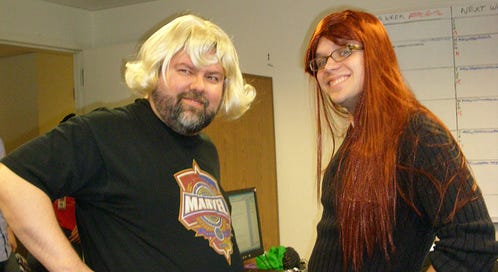



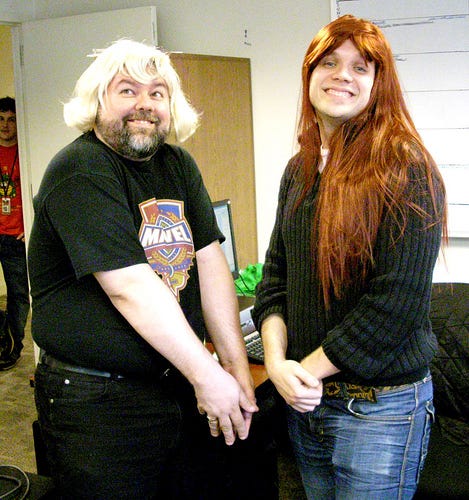
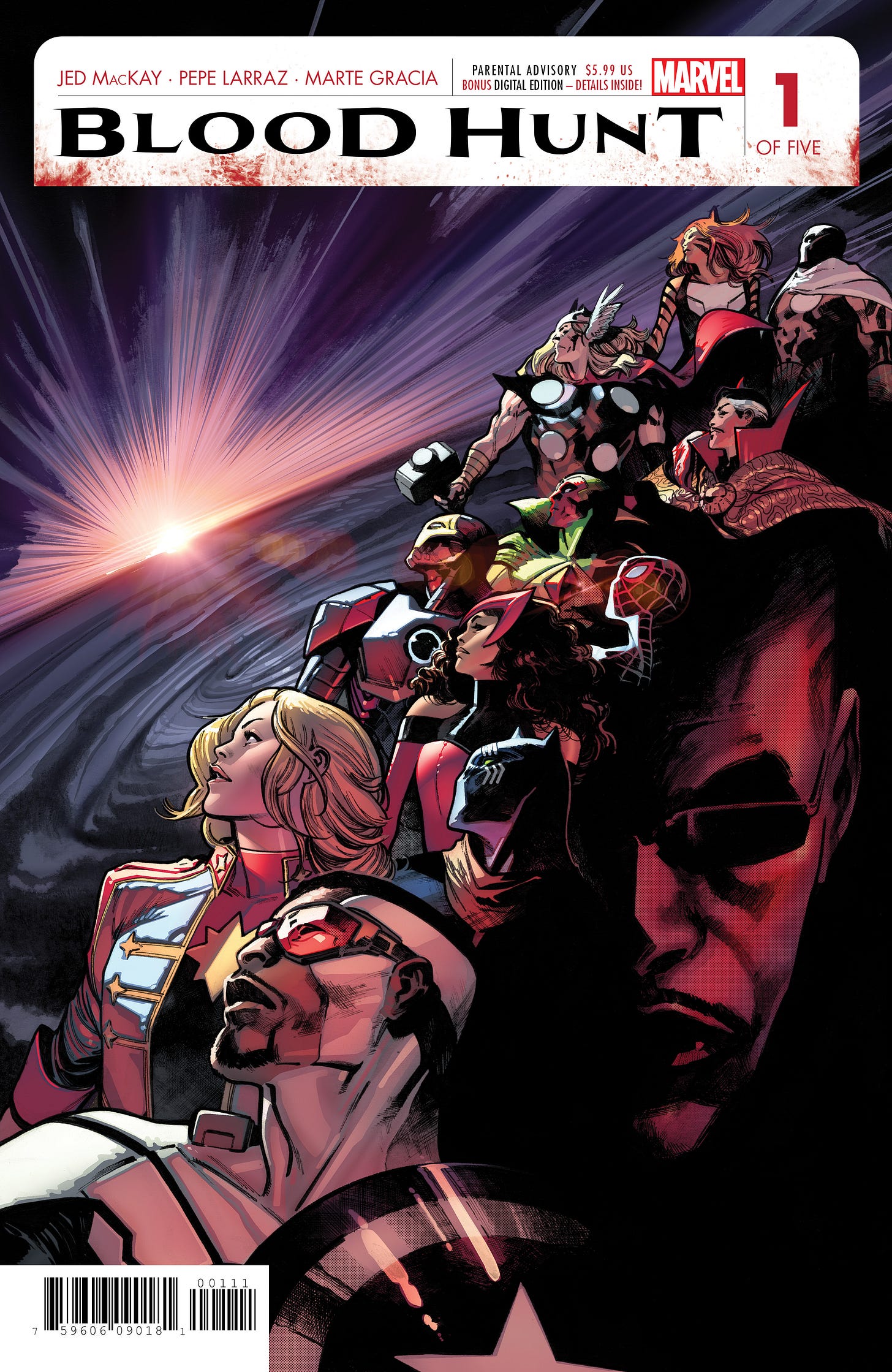



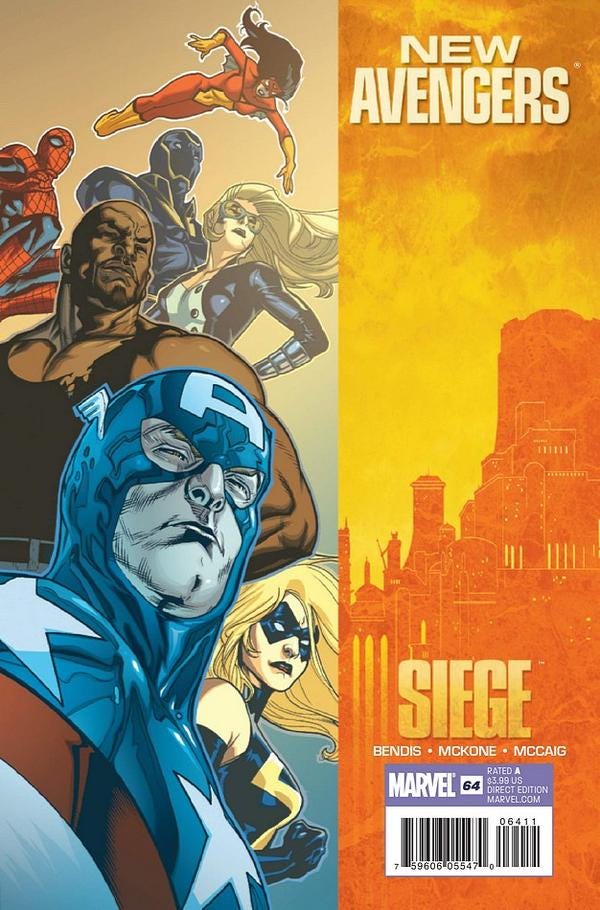
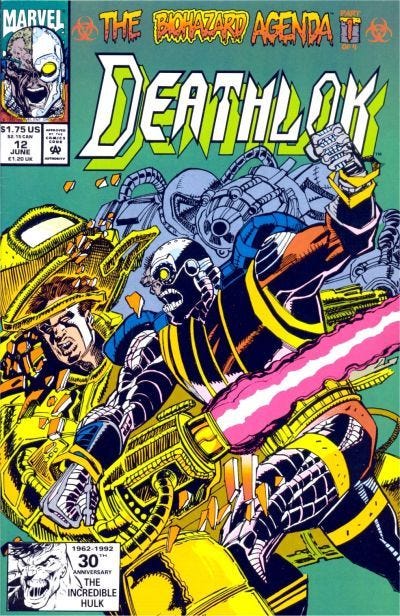
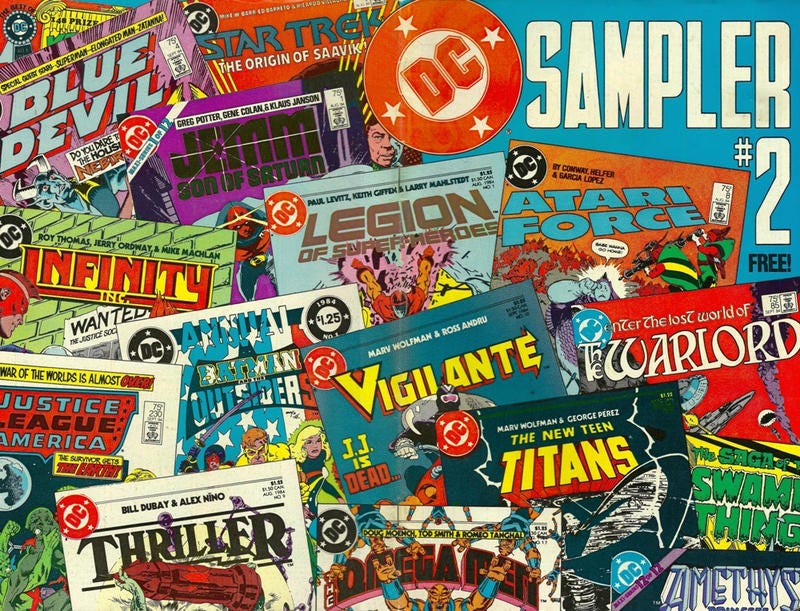
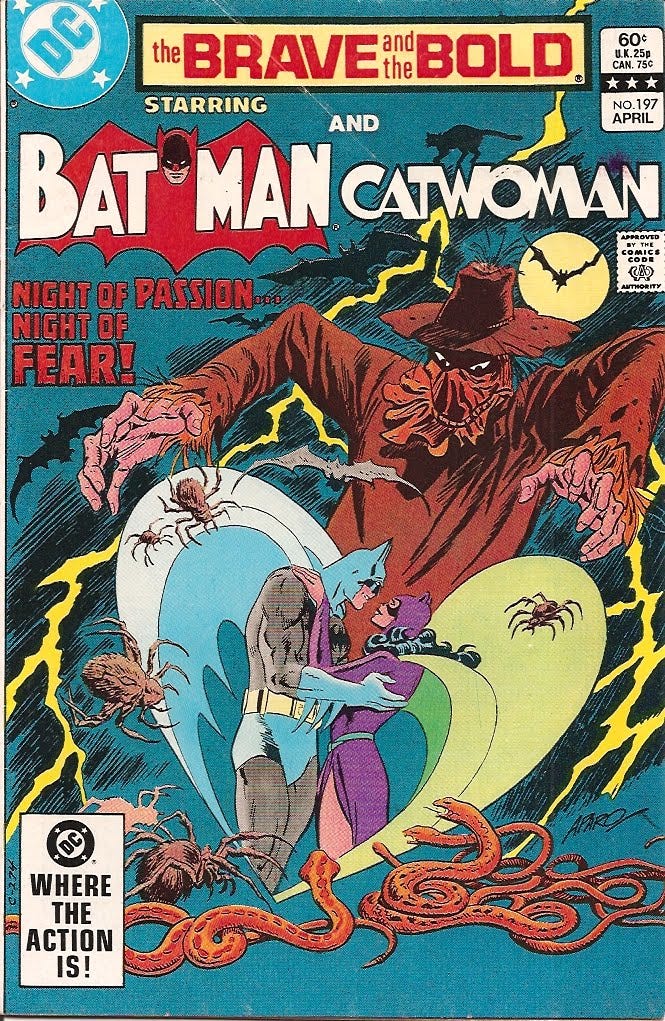
Hi Tom, just a couple of questions. They might be a bit retentive, but that's just what you get with hardcore comic fans.
1. At least from the early marketing, it seems that Jed's Adjectiveless X-Men is going to be the main book of the era, while Simone's Uncanny X-Men is the spinoff title. What went into this decision given that Uncanny is the original X-Title. Should we expect Uncanny to no longer be the main book long term?
2. I found your discussion on Xavier fascinating. You mention that he has been increasingly seen/portrayed as incorrect in his eternal argument with Magnus. It seems to me that this coincides with larger cultural discussions about the downsides of assimilation and "White normativity". Will there ever come a moment when the entire franchise should pivot its morality away from assimilation and towards a new, less problematic Cyclops-style dream that embraces mutant self-rule?
3. I realize this last question might be a bit sensitive, but there's a lot of discussion of it within the fan community. Recent runs of Deadpool, Black Panther, Guardians of the Galaxy and other B-list books have all ended at around 10 issues. From the outside there doesn't seem to be a problem with sales, so why do these runs keep getting smaller? As a fan, longer runs tend to produce deeper stories more worth following, so this has been frustrating.
I've got kind of an odd ad question. For years now, Marvel books have routinely featured full-page movie poster ads for various MCU projects...BUT if you read them more closely, they're always advertising the streaming release of the soundtracks for these projects. It's always seemed odd to me; is there some kind of movie advertising loophole this gets around, or is there just a desire to get people to listen to the scores of the new releases?